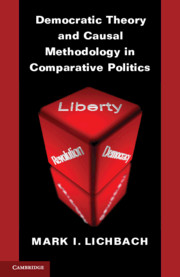Book contents
- Frontmatter
- Contents
- List of Tables
- Preface
- 1 Methodology’s Problem, and Democracy’s Too
- Part I Rationalism and Constructivism
- Part II State-Society and Contentious Politics
- Part III Conclusions: Three Chapters, Five Themes, and Twelve Theses
- 7 Agency
- 8 Research Schools
- 9 Political Power and Democratic Performance
- References
- Index
8 - Research Schools
Published online by Cambridge University Press: 05 May 2013
- Frontmatter
- Contents
- List of Tables
- Preface
- 1 Methodology’s Problem, and Democracy’s Too
- Part I Rationalism and Constructivism
- Part II State-Society and Contentious Politics
- Part III Conclusions: Three Chapters, Five Themes, and Twelve Theses
- 7 Agency
- 8 Research Schools
- 9 Political Power and Democratic Performance
- References
- Index
Summary
Comparativists (LaPalombara 1970) did not like their battle of the paradigms in the 1960s and comparativists (Laitin 2007: 642–43) do not like the battle now. Intellectual contention among methodologies is also seen as an academic vice that holds no scholarly virtue. The critics suggest that paradigmatic and methodological discourses kill scientific inquiry. Studying philosophy of science means not doing actual science; exploring abstract methodology means not addressing concrete problems.
This book disagrees. Comparativists work with paradigms in the midst of things, and methodological reflection is part of their working life. Comparativists who dislike philosophy of science are commonly in the grips of an old philosophy of science; and hostility to social theory often masks support of one’s favorite social theory. As Eagleton (2008: xi–xii) put it, “Keynes once remarked that those economists who disliked theory, or claimed to get along better without it, were simply in the grip of an older theory. . . . Hostility to theory usually means an opposition to other people’s theories and an oblivion of one’s own.” Without some philosophy of science, comparativists cannot distinguish good from bad science; and without some social theory, comparativists cannot distinguish good from bad theory. Comparing comparativists’ paradigms thus offers valuable distance from actual scientific practices. Comparativists can then reflect on the routinely accepted methodologies behind their working structures of problem solving.
- Type
- Chapter
- Information
- Democratic Theory and Causal Methodology in Comparative Politics , pp. 177 - 202Publisher: Cambridge University PressPrint publication year: 2013



